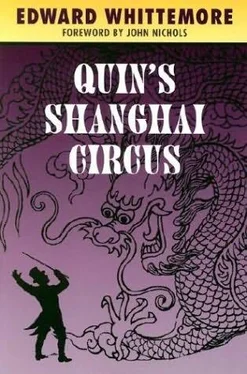Edward Whittemore - Quin’s Shanghai Circus
Здесь есть возможность читать онлайн «Edward Whittemore - Quin’s Shanghai Circus» весь текст электронной книги совершенно бесплатно (целиком полную версию без сокращений). В некоторых случаях можно слушать аудио, скачать через торрент в формате fb2 и присутствует краткое содержание. Жанр: Фэнтези, на английском языке. Описание произведения, (предисловие) а так же отзывы посетителей доступны на портале библиотеки ЛибКат.
- Название:Quin’s Shanghai Circus
- Автор:
- Жанр:
- Год:неизвестен
- ISBN:нет данных
- Рейтинг книги:3 / 5. Голосов: 1
-
Избранное:Добавить в избранное
- Отзывы:
-
Ваша оценка:
- 60
- 1
- 2
- 3
- 4
- 5
Quin’s Shanghai Circus: краткое содержание, описание и аннотация
Предлагаем к чтению аннотацию, описание, краткое содержание или предисловие (зависит от того, что написал сам автор книги «Quin’s Shanghai Circus»). Если вы не нашли необходимую информацию о книге — напишите в комментариях, мы постараемся отыскать её.
Quin’s Shanghai Circus — читать онлайн бесплатно полную книгу (весь текст) целиком
Ниже представлен текст книги, разбитый по страницам. Система сохранения места последней прочитанной страницы, позволяет с удобством читать онлайн бесплатно книгу «Quin’s Shanghai Circus», без необходимости каждый раз заново искать на чём Вы остановились. Поставьте закладку, и сможете в любой момент перейти на страницу, на которой закончили чтение.
Интервал:
Закладка:
Quin’s Shanghai Circus
Edward Whittemore
To remain whole, be twisted.
To become straight, let yourself be bent.
To become full, be hollow.
Be tattered, that you may be renewed.
Those that have little, may get more,
Those that have much, are but perplexed.
The Sage does not show himself, therefore he is seen
everywhere.
He does not define himself, therefore he is distinct.
He does not boast of what he will do, therefore he
succeeds.
He is not proud of his work, and therefore it endures.
He does not contend,
And for that very reason no one under heaven can
contend with him.
For by grace are ye saved through faith, and that not of
yourselves. It is the gift of God. Not of works, lest any
man should boast.
The Impostor
The suspicious illness and subsequent investigation of a corporal serving in Mukden suggest that an espionage network with astonishing capabilities is operating within the Empire.
The net has access to such important material it must include a member of the General Staff, in addition to whatever foreigners are involved.
The corporal died while undergoing questioning. Just before death, however, he revealed two unrelated facts.
1. The code name of the net is Gobi (the barbarian name for the .great desert in western China) .
2. The unknown disease from which he was suffering is called, phonetically , Lam-ah-row’s Lumbago.
—From a secret report submitted in the autumn of 1937 to Baron Kikuchi, Japanese General in charge of intelligence activities in Manchuria.
The report was said to have been seen in the archives of the Imperial Japanese Army immediately after the surrender in 1945. But it never reached Allied intelligence officers, having been either lost or destroyed in the first days of the Occupation.
Some twenty years after the end of the war with Japan a freighter arrived in Brooklyn with the largest collection of Japanese pornography ever assembled in a Western tongue. The owner of the collection, a huge, smiling fat man named Geraty, presented a passport to customs that showed he was a native-born American about as old as the century, an exile who had left the United States nearly four decades before.
The collection contained all the pornographic works written in Japan during the last three hundred and fifty years, or since the time when Japan first closed itself to the West. More important, it included rare manuscripts from several thirteenth-century Buddhist monasteries.
According to Geraty, the very existence of these manuscripts had never been suspected. The tales they told began harmlessly, but before the scholar reached the end of the second page he was confronted with astonishingly obscure practices, and by the beginning of the third page he was totally immersed in devices and dreams and masks, all serving the wildest sort of inversions.
The manuscripts were illustrated with ink drawings exquisitely detailed to show every hair. Even the cat hairs could be counted, where cats appeared.
For the officials at the Brooklyn customs house the sudden appearance of Geraty’s collection was an uncommon event. Although they frequently handled questionable materials, never in anyone’s memory had the pornography to be examined been of such vast scope.
Thus a second official immediately applied himself to the case, and a third soon joined the second. In fact by the end of Geraty’s first day in New York there were no less than eight customs officials of differing ranks and seniority, representing a reliable spectrum of American ethnic and racial and cultural backgrounds, lined up behind a row of desks at one end of the spacious customs warehouse in Brooklyn, solemnly listening to Geraty deliver a lecture on the secret merits of his collection.
He noted at random, for example, in order to emphasize the artistry of the drawings, the patina that had been worked into the leather phalluses and the grain that showed in the spiraled ivory finger pieces. Because of these touches, he claimed, a specialist could easily tell whether the leather was cow or pig or whether the ivory was from north or south India.
The women depicted in the illustrations were as numerous as the men, but they were always shown with their own kind. There was no mixing of the sexes.
After pointing out the value of the manuscripts in the fields of animal husbandry, trade, and sociology, Geraty went on to discuss their literary and historical merits.
The manuscripts were invariably told in the first person. Therefore they were source material for modern Japanese fiction, which was also confessional.
The century under study, the thirteenth, was an era of national upheaval in Japan, an age of revolution led by innumerable orders of fanatical monks. Therefore the manuscripts were a record of the unknown thoughts of these warring monks at a time when Zen and the game of Go , the tea ceremony, rock gardens, and No plays and so many other unique Japanese arts, notorious for their refinement and austerity, first became revered throughout the islands.
Geraty, in short, was able to trace most of modern Japanese history to the pornographic fantasies found in his collection.
The documents had been translated and bound under his personal supervision, a project that had taken forty years of his life. Although reluctant to part with his treasure, he was now returning to the United States to retire. He intended to sell the collection to a university or some other academic institution so that it could be available to scholars.
Or so he claimed.
Finally, with special pride, Geraty discussed his system of annotations. The system was exclusive and comprehensive, his own invention, and could only be understood by using the key or code book. It consisted of numbers in the margins, entered by hand, often as many as sixty-four numbers next to only one line of print. The drawings were thus wedged in between swarms of minute jottings.
These masses of numbers, it seemed, identified and cross-referenced every real or imagined act that took place in all those tens of thousands of pages.
Because he was so fat, Geraty sometimes gave the impression of being less than a giant. When he was sprawled over a bench in the customs warehouse waiting for his audience to assemble, doing nothing, staring blankly at the ceiling, he looked as if he might be only six and a half feet tall. But the moment he began to gather up his arms and legs, a transformation took place.
He seemed to put on weight as he pulled his parts together. It took several minutes for him to find his balance, but when at last he was standing he filled the room he was in, any room, his immense bulk the equal of three or four large men.
Geraty leaned far back to keep his belly from dragging him over. His feet were splayed to support his body, his chin rested on his chest, his massive arms stood out to the sides. When he moved, his hands hung behind him, stiffly jarred by each step. His white hair was clipped short in outdated military fashion and his face was scarred by pockmarks, or perhaps a combination of pockmarks and poorly treated knife wounds.
When he got to his feet the blood rushed to his head, causing it to expand, opening the pits and scars. After a while this swelling subsided together with the deep purple coloring that had accompanied it.
Geraty arrived in New York toward the end of winter. The unraveled tops of three or four sweaters showed at his neck, which was swathed in a piece of red flannel tied with a string. He wore torn military boots, the type issued to American soldiers during the Second World War, and a black bowler hat that might have belonged to a circus performer in the 1920s. Over everything was a military greatcoat, ancient and spotted and patched, of no recognizable era or campaign. Despite his size the ancient greatcoat covered him completely to the floor.
Читать дальшеИнтервал:
Закладка:
Похожие книги на «Quin’s Shanghai Circus»
Представляем Вашему вниманию похожие книги на «Quin’s Shanghai Circus» списком для выбора. Мы отобрали схожую по названию и смыслу литературу в надежде предоставить читателям больше вариантов отыскать новые, интересные, ещё непрочитанные произведения.
Обсуждение, отзывы о книге «Quin’s Shanghai Circus» и просто собственные мнения читателей. Оставьте ваши комментарии, напишите, что Вы думаете о произведении, его смысле или главных героях. Укажите что конкретно понравилось, а что нет, и почему Вы так считаете.












